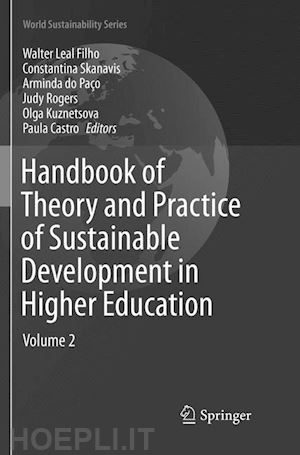
Questo prodotto usufruisce delle SPEDIZIONI GRATIS
selezionando l'opzione Corriere Veloce in fase di ordine.
Pagabile anche con Carta della cultura giovani e del merito, 18App Bonus Cultura e Carta del Docente
This Handbook approaches sustainable development in higher education from an integrated perspective, addressing the dearth of publications on the subject. It offers a unique overview of what universities around the world are doing to implement sustainable development (i.e. via curriculum innovation, research, activities, or practical projects) and how their efforts relate to education for sustainable development at the university level.
The Handbook gathers a wealth of information, ideas, best practices and lessons learned in the context of executing concrete projects, and assesses methodological approaches to integrating the topic of sustainable development in university curricula. Lastly, it documents and disseminates the veritable treasure trove of practical experience currently available on sustainability in higher education.
Sustainable Cities, Sustainable Universities: Re-engineering the Campus of Today for the World of Tomorrow.- The Role of Kenya’s Formal Higher Education in Sustainable Development within the Context of Globalization.- Sustainable Development at Universities as Viewed through the Lens of the Promise Framework for Sustainability.- The Role of Non-academic Staff in Designing the Green University Campus.- So Tell Me What You Want, What You Really Really Want: Including the User Perspective Before Implementing Measures of Sustainability.- Strategic Performance of Sustainable Campus Development: Case Study of a Multi-Campus Tertiary Institution in a Highly Dense City of Asia.- Networking the Sustainable Campus Awards: Engaging with the Higher Education Institutions in Developing Countries.
Walter Leal Filho (BSc, PhD, DSc, DPhil, DEd, DL, DLitt) is a Senior Professor and Head of the Research and Transfer Centre "Applications of Life Sciences" at Hamburg University of Applied Sciences in Germany, and Chair of Environment and Technology at Manchester Metropolitan University, UK. He is the initiator of the Word Sustainable Development Symposia (WSSD-U) series, and chairs the Inter-University Sustainable Development Research Programme. Professor Leal Filho has written, co-written, edited or co-edited more than 300 publications, including books, book chapters and papers in refereed journals.
Constantina Skanavis is a Professor of Environmental Communication and Education at the Department of the Environment, University of the Aegean. She is also the Head of the Research Centre of Environmental Education and Communication. She joined the University of the Aegean 15 years ago. Before that she was a Professor at California State University, Los Angeles. She has developed several courses on issues concerning environmental health and education, and currently teaches environmental education, environmental communication and environmental interpretation courses at the undergraduate and postgraduate levels. Professor Skanavis has authored numerous publications on an international basis and has given presentations all over the world.
Arminda do Paço is an Assistant Professor at the University of Beira Interior, Portugal, and holds a PhD in Management. She is currently a researcher at the NECE – Research Unit of Business Sciences as well as Director of the Master Degree Program in Marketing. Her areas of interest are mainly sustainability and environmental marketing, as well as entrepreneurship education. She has published several articles and chapters in international publications, and has participated in several national and international research projects, including the “Entrepreneurship Curriculum Programme Impact Study” funded and promoted by the UNIDO, and the ICT Entrepreneur and SCIENT project, funded by the Erasmus + Programme.
Judy Rogers is a Senior Lecturer and Program Manager for the Master of Disaster Design and Development program at the School of Architecture and Design, RMIT. She has substantial experience in and a strong commitment to urban sustainability and community engagement. She has been responsible for the development and delivery of innovative curricula in sustainability and community partnerships and for leading and mentoring staff to deliver those curricula. She has presented papers at a number of major international sustainability conferences and has written extensively on urban sustainability and sustainability education. Her qualifications include a PhD focusing on sustainable city policy, a Master of Environmental Science and more recently, in 2012, a Diploma in Management.
Olga Kuznetsova (PhD) is a Lecturer for Comparative Business Studies at the Manchester Metropolitan University Business School. Her publications address business and organizational practices in institutionally weak environments in the context of emerging market economies.
Paula Cristina Castro is currently an Invited Auxiliary Professor at the Department of Life Sciences, University of Coimbra. She began her educational career in 1997, having taught several courses in the fields of Biology, Ecology, Environmental Management, Soil Ecology and Pollution, Environmental Impact Assessment, Integrated Management Systems, and Environmental Education. She is a Senior Researcher at the Centre for Functional Ecology, University of Coimbra and her main research interests include forest and urban ecology, plant functional attributes, environmental education, and the application of GIS as a tool for the analysis and prediction of future scenarios and to support decision making in biodiversity, ecology and ecosystem management.











Il sito utilizza cookie ed altri strumenti di tracciamento che raccolgono informazioni dal dispositivo dell’utente. Oltre ai cookie tecnici ed analitici aggregati, strettamente necessari per il funzionamento di questo sito web, previo consenso dell’utente possono essere installati cookie di profilazione e marketing e cookie dei social media. Cliccando su “Accetto tutti i cookie” saranno attivate tutte le categorie di cookie. Per accettare solo deterninate categorie di cookie, cliccare invece su “Impostazioni cookie”. Chiudendo il banner o continuando a navigare saranno installati solo cookie tecnici. Per maggiori dettagli, consultare la Cookie Policy.